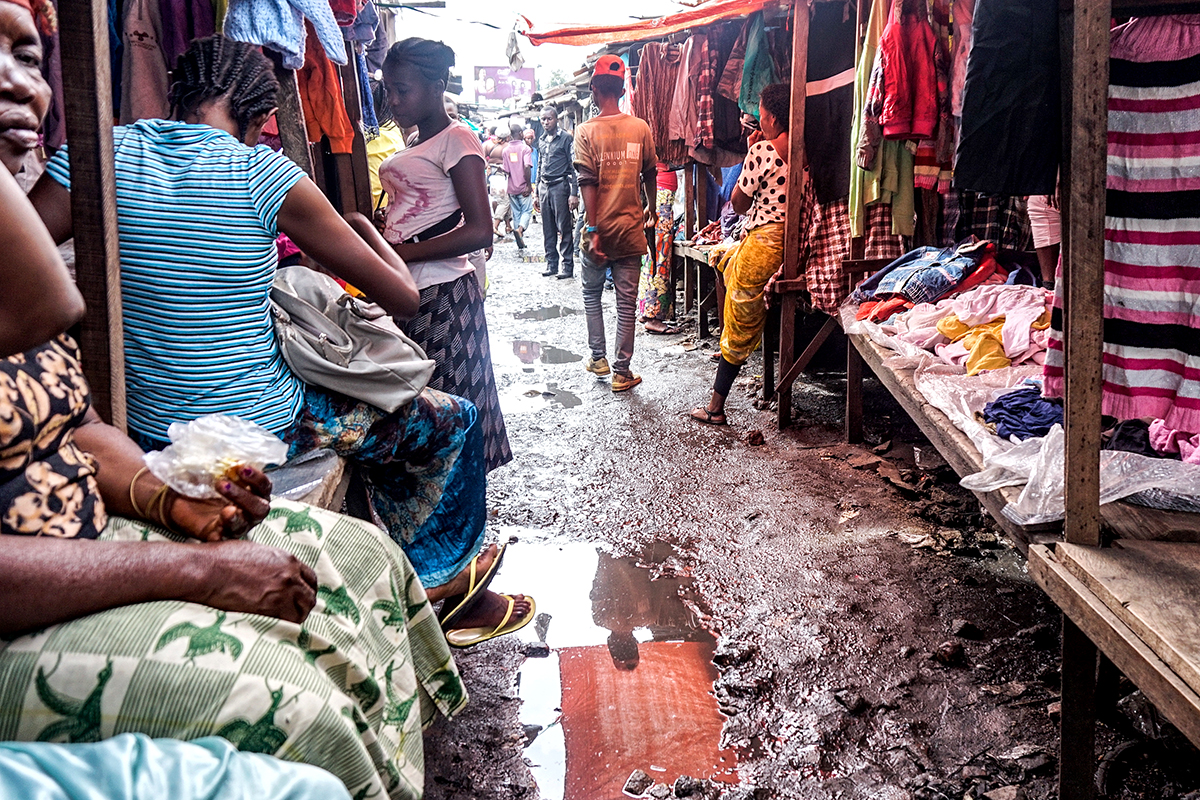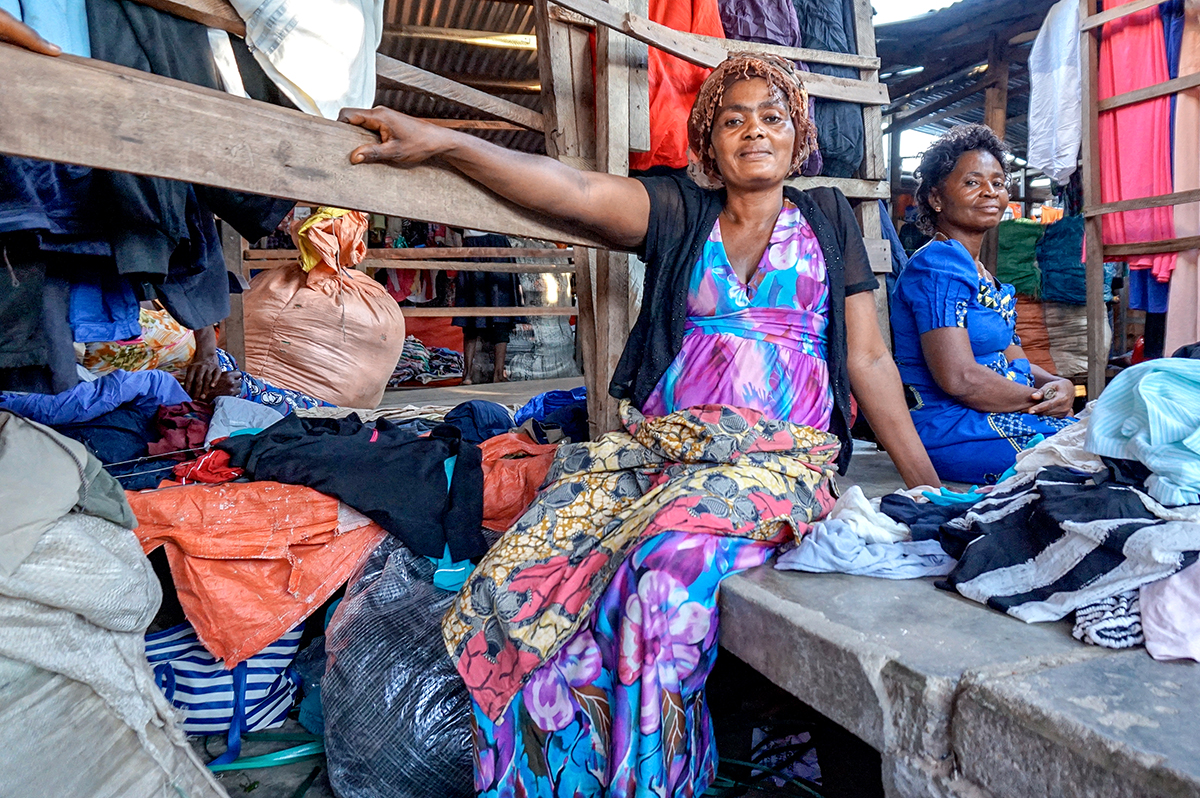KISANGANI, DEMOCRATIC REPUBLIC OF CONGO – The stench at the market entrance forces Dorcas Moseka to cup her hands over her nose.
The smell of month-old garbage overpowers the aromatic whiffs of grilled fish and meats sold in Kisangani’s central market.
Moseka has been a vendor at this market for 13 years. She sells previously owned clothing from a stall with a small roof to protect the items from rain and sunlight. Every morning, she makes her way to her stall and attempts to block out the foul smell.
When it rains, it gets worse, Moseka says. December through February is a drier season here, but rains are often unpredictable. Rainwater drags stray pieces of litter into muddy puddles scattered about the market. Customers tread the grounds with caution.



“Each of us remains exposed to unsanitary conditions, especially on rainy days,” Moseka says of customers and fellow vendors.
Vendors pay a daily fee of 300 Congolese francs (19 cents) per stall to sell their goods here. Those fees are intended to pay for market maintenance and infrastructure upgrades, but Moseka says improvements haven’t been made as promised.
Vendors at Kisangani’s central market say squalid conditions are threatening their livelihood because customers have become hesitant to shop here. Tax collectors appointed by the provincial government have been collecting market fees and taxes, but vendors allege negligence and mismanagement in the collection system as maintenance and infrastructure upgrades in the market are years overdue.
Société Civile de la Tshopo, an organization of residents who live in the northeastern province, is now facilitating the collection of market fees and taxes in an effort to bring transparency to the process and improve conditions in the market.
Kisangani is one of the major trading hubs in the Tshopo province. Poor infrastructure such as a rundown system of roads, however, hinders economic activity at the state-owned central market, which has been open for more than 60 years.



As many as 2,000 customers come to the market every day, says David Yofemo, president of the Société Civile de la Tshopo. He says that the market, with 5,000 vendors, can generate more than 1 million francs ($628) in market fees every day, which he says the provincial government uses to cover utilities including electricity, as well as pay security guards who work in the market day and night. Officials also collect a 7,000-franc ($4.40) tax at the end of every month from each vendor that is supposed to be used for garbage collection and cleaning services.
Tax collectors deposit the market fees in the provincial government treasury. Taxes collected from market vendors are combined with other types of taxes collected throughout the province each month, and also deposited in the treasury.
While vendors are promised certain services for making these payments, the government determines what the taxes will be used for in the province, says Modestine Koya, the secretary of the provincial government’s department of economy and finance.
Koya says the provincial government has invested in the market consistently since it opened in 1951, citing 2011 as the last time new stalls were added and broken roofs were fixed. But vendors say too much time has passed since those renovations. To the vendors, poor market conditions, along with the provincial government’s failure to communicate the intended use of the taxes, suggests mismanagement of funds.
In August, the Société Civile de la Tshopo began supervising the collection of market fees and taxes in order to ensure that appointed tax collectors take dues from every market vendor and deposit the money in the provincial government treasury. Members of the civil organization then record the sum of fees and taxes. Yofemo says this will make the process more transparent.



Christine Mwaka, a tomato seller, lives near the central market and says its unsanitary state is what drives her customers away.
Salama Tuzinde, a mother of 10 who shops in the market, agrees. She says she can’t help but worry about the unsanitary conditions and the health hazards that they pose, even though food items sold at the market are cheap.
“The central market has everything we need, and we can’t miss it. In spite of all this, however, the market is full of pools of stagnant water and mud puddles and obstructed ditches with solid waste littered around, but we’ve no choice, because it’s the only market which helps us live off of our shoestring budget,” Tuzinde says.
Vicky Bokota, a nutritionist, says poor sanitary conditions at the market may have harmful health consequences. People can contract typhoid fever from buying and consuming products from vendors who have the illness, he says. With just three dirty restrooms in the market for more than 5,000 shoppers, Bokota says, it is likely that vendors are unable to practice thorough hygiene, which could lead to food contamination.
Moseka says she would like to sell her clothing in a cleaner retail space in downtown Kisangani, but she cannot relocate because the daily market fees and monthly taxes are cheaper than the rent she would pay elsewhere. She says she barely makes enough money now to take care of her four children because her regular customers prefer to shop in department and grocery stores, where it is cleaner.
Ndayaho Sylvestre, GPJ, translated this article from French.







